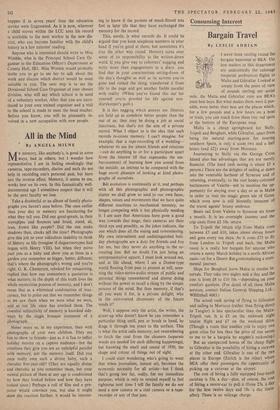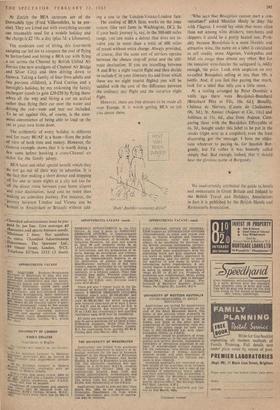Consuming Interest
Bargain Travel
By LESLIE ADRIAN
HAVE been rooting round the bargain basement at BEA The loss leaders in this department are undoubtedly the cabotage (imperial preference) flights to Malta and Gibraltar. Looked at '
simply from the point of view
of pounds sterling per aerial mile, the Malta and Gibraltar runs are BEA's joint best buys. But what makes them, were it pos- sible, even better than best are the places which, for a few pounds and a few hours on a boat or train, you can reach from these tiny red spots at the bottom of the European map.
Malta is a cheap springboard for Sicily, Tripoli and Benghazi, while Gibraltar, apart from being the natural starting-post for touring southern Spain, is only a scant two and a half hours (and £2+) away from Morocco.
Journeying to Sicily via the George Cross Island also has advantages that are not merely financial. (The hard cash saving is about £5 a person.) There are the delights of sailing at dawn into the venerable harbour of Syracuse and of returning, eventually, to the vast honey-coloured battlements of Valetta—not to mention the op- portunity for staying over a day or so in Malta in order to visit the magic green isle of Gozo, which even now is still blessedly innocent of the travel agents' brassy embrace.
Boats sail from Valetta to Syracuse six times a month. It is an overnight journey and the trip costs from £2 10s. return.
To Tripoli the return trip from Malta costs between £5 and £10, takes about eleven hours and goes every ten days. As it costs £75 to fly from London to Tripoli and back, the Malta route is a really hot bargain for anyone who craves a sunny March holiday in a north African oasis—or for a Desert Rat contemplating a senti- mental journey.
Ships for Benghazi leave Malta at similar in- tervals. They take two nights and a day and the cost is from £8 to £16 10s.—depending on your comfort quotient. (For detail of all these Malta services, contact Italian General Shipping Ltd.: WHitehall 6083.) The actual cash saving of flying to Gibraltar and sailing to Morocco (rather than flying direct to Tangier) is less spectacular than the Malta- Tripoli run. It is £3 on the midweek night tourist flight and £7 on the weekend ditto. (Though a route that enables you to enjoy two great cities for less than the price of one seems to me to be a bargain by anyone's reckoning) But an unexpected bonus of the cheap flight to Gibraltar is the possibility of hiring a caravan at the other end. Gibraltar is one of the two places in Europe (Zurich is the other) where BEA offer their passengers the opportunity of picking up a caravan at the airport.
The cost of hiring a fully equipped four-berth caravan is 35s. a day—plus, of course, the cost of hiring a motor-car to pull it (from 27s. a day for the first twelve days and 18s. a day there- after). There is no mileage charge. At Zurich the BEA caravans are of the Dormobile type (Ford Villamobiles, to be pre- cise). They are kitted out with everything anyone can reasonably need for a mobile holiday and the charge is £2 19s. a day (plus 7d. a kilometre).
The moderate cost of hiring this four-berth camping car led me to compare the cost of flying to Switzerland and hiring a BEA car with flying a car across the Channel by British United Air Ferries (the new amalgam of Channel Air Bridge and Silver City) and then driving down to Geneva. Taking a family of four (two adults and two pre-teen children), a Ford Cortina and a fortnight's holiday, by my reckoning the family exchequer stands to gain £20-£30 by flying them- selves all the way and hiring a car on arrival rather than flying their car over the water and driving the rest—wear and tear not included. To be set against this, of course, is the enor- mous convenience of being able to load up the car at your own front door.
The arithmetic of every holiday is different and for many BUAF is a boon—from the point of view of both time and money. However, the Geneva example shows that it is worth doing a few sums before booking a cross-Channel air ticket for the family jalopy.
BEA have one other special benefit which they do not go out of their way to advertise. It is the fact that making a short detour and stopping off for one or more nights at a city not too far off the direct route between your home airport and your destination, need cost no more than Making an unbroken journey. For instance, the journey between London and Vienna can be broken in Amsterdam or Brussels without add- ing a sou to the London-Vienna-London fare.
The costing of BEA fares works on the zone system (like taxi fares in Washington, DC). So if your basic journey is, say, in the 500-600 miles range, you can make a detour that does not in- volve you in more than a total of 600 miles of travel without extra charge. Always provided, of course, that the same sort of services operate between the chosen stop-off point and the ulti- mate destination. If you are travelling between A and B by a night tourist flight and then decide to include C in your itinerary (to and from which there are no night tourist flights) you will be saddled with the cost of the difference between the ordinary day flight and the cut-price night 11 ight.
However, there are free detours to be made all over Europe. It is worth getting BEA to tell you about them.
'11 tfh! 'Another economy dri re!'
`Who says that Beaujolais cannot start a con- versation?' asked Maurice Healy in Stay Me with Flagons. I would lay odds that more often than not among wine drinkers, merchants and shippers it could be a pretty heated one. Prob- ably because Beaujolais is a most likeable and attractive wine, the name on a label is calculated to sell readily more Algerian, Valdepefias and Midi yin rouge than almost any other. But for the innocent wine-fancier the safeguard is, oddly enough, the price. Look with suspicion on any so-called Beaujolais selling at less than 10s. a bottle. And, if you feel like paying that much, look for a label that tells you a little more.
At a tasting arranged by Peter Dominic a while ago there were Beaujolais-Bouchard (Bouchard Pere et Fils, 10s. 6d.), Brouilly, Château de Nervers (Comte de Chabannes, 10s. 3d.), St. Amour (Aujoux et Cie., 1 Is.) and fulienas at Hs. 6d., also from Aujoux. Com- paring these with the Beaujolais Effroyable at 6s. 3d., bought under this label to be put in the stocks (right next to a cuspidor), even the least discerning got the 'message. I have no objec- tion whatever to paying 6s. for Spanish Bur- gundy, but I'd rather it was honestly called simply that. Bad enough, indeed, that it should bear the glorious name of Burgundy.
We inadvertently attributed the guide to hotels and restaurants in Great Britain and Ireland to the British Travel and Holidays Association; in fact it is published by the British Hotels and Restaurants Association.



































 Previous page
Previous page